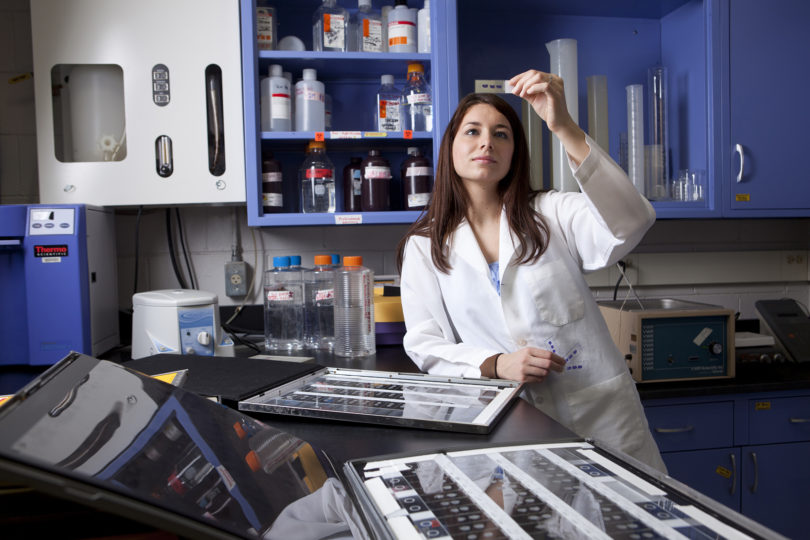Athens, Ga. – The University of Georgia is rolling out an initiative to increase the enrollment of graduate students by offering new funding opportunities, innovative interdisciplinary programs and a wider array of professional development opportunities.
Senior Vice President for Academic Affairs and Provost Pamela Whitten noted that graduate students are drawn to UGA for the opportunity to be mentored by faculty members who are at the leading edge of their fields, and those same graduate students advance knowledge and discovery through their independent work.
“Extraordinary graduate programs and a thriving research enterprise go hand-in-hand,” Whitten said, “and both are on an upward trajectory at UGA.”
New funding opportunities
To help increase the number of graduate students on campus, the university recently expanded its Voluntary Incentive Program, which returns 1.555 times the cost of the university’s full-time, in-state tuition to the department of a faculty member who funds graduate students through their research or training grants. The funds from the program, formally known as the Research Incentive Assistantships Voluntary Incentive Program, cover the cost of an additional “VIP” doctoral assistantship to effectively double the number of graduate students that faculty can fund through their grants.
In addition to expanding the Voluntary Incentive Program, UGA’s Graduate School has hired a full-time grants coordinator to help faculty successfully compete for training grants that support graduate students in areas that align with their areas of expertise. UGA faculty members received more than $4 million in training grants from the National Science Foundation and the National Institutes of Health in the last fiscal year alone, and the new grants coordinator will help increase that figure by assisting faculty members in identifying funding opportunities and preparing grant submissions.
“Training grants not only provide support for students,” said Suzanne Barbour, dean of the Graduate School, “they are also recruiting tools for graduate programs. Receipt of a training grant is a mark of excellence that is recognized by students, faculty and prospective applicants.”
Innovative interdisciplinary programs
UGA already offers several interdisciplinary graduate programs in fields ranging from bioinformatics to neuroscience and toxicology. To build on this momentum and prepare students to confront grand challenges that cross disciplinary boundaries, the Graduate School is working with the other schools and colleges on campus to develop new interdisciplinary master’s and doctoral degree programs.
Through a competitive internal grant program that will be launched this fall, the Graduate School will jump start new interdisciplinary programs by providing “seed monies” that will fund 2.5 doctoral level assistantships, with a required match of 2.5 doctoral assistantships from the other schools and colleges. Barbour noted that through this mechanism, “the Graduate School will be a catalyst that inspires faculty to create new graduate programs, especially those at the intersection of complimentary disciplines.”
Expanded professional development
Graduate education-particularly at the doctoral level-has historically trained students for careers in academia, but national data show that the majority of graduate students find careers in industry, non-profits and other career tracks. The depth of knowledge and advanced skills that graduate education offers is more in demand than ever, Barbour emphasized, but today’s students also need communication, collaboration and problem-solving skills that transcend disciplines.
A new program known as Graduate Scholars Leadership, Engagement and Development, or GS LEAD, helps prepare graduate students for a broad range of career choices through an immersive summer academy and a community engagement course that will be guided by faculty members from UGA’s Fanning Institute for Leadership Development and the Archway Partnership. GS LEAD is funded by a $495,000 National Science Foundation grant, and the first class of 14 students began this summer.
As a first step toward implementing additional professional development programs, the Graduate School is currently cataloguing existing programs and will conduct a needs assessment in the fall. It also is partnering with the Office of Institutional Diversity to increase the enrollment of underrepresented groups in graduate programs.
UGA’s initiative to elevate graduate and professional education aligns with the institution’s strategic plan as well as broader national labor trends.
“Providing excellent graduate and professional education is central to UGA’s mission,” said President Jere W. Morehead. “This important new initiative will help the university advance its strategic priorities of expanding the research enterprise and developing leaders to address the world’s increasingly complex challenges.”
According to the Bureau of Labor Statistics, careers that require a master’s degree are projected to grow the fastest in the coming years-nearly 14 percent from 2014 to 2024, compared to eight percent for degrees requiring a bachelor’s degree. Careers requiring a doctoral or professional degree are expected to grow 12 percent over the same time period and have a median annual wage that is nearly three times greater than the median for all degree levels.








